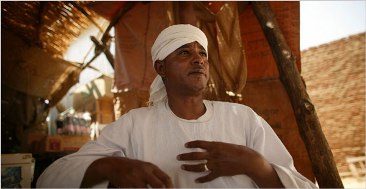Janjaweed leader defects from NCP, establishes new political movement
January 4, 2014 (KHARTOUM) – The leader of the Darfurian Arab Mahameed clan and an advisor at the Sudan Federal Government Chambers (SFGC), Musa Hilal, has defected from the ruling National Congress Party (NCP) and announced the establishment of a new political movement under the name of The Sudanese Awakening Revolutionary Council (SARC).

He pointed that they are committed to securing human rights, power and wealth sharing, development and settling down of nomadic tribes, compensating victims of the armed conflict, reconciliation among Darfur tribes, dialogue, and legalizing status of Arab militias within a framework of security arrangements.
Babiker expressed readiness to achieve their goals through peaceful negotiations in a neutral country, saying that all options are open if the government refuses to respond to their demands.
He further pointed their coordination with the rebel Sudan Revolutionary Front (SRF), saying that they share the same objective.
However, the NCP leading figure, Rabie Abdel-Aati, said that the move would only widen the rift between Hilal and the NCP and pointed that they refuse Hilal’s manipulation of ethnicity and tribalism, adding that the tribal leader is at crossroads.
In September of last year, Hilal fiercely attacked senior government officials and in particular the governor of North Darfur state Osman Mohamed Youssef Kibir, accusing him of triggering the bloody tribal clashes between the Beni Hussein and Rezeigat.
In recent years he started making statements critical of the NCP, of which he is a member, and calling for deep reforms.
Hilal was rumored to have left the NCP and joined the new party established last December by party defectors led by former presidential adviser Ghazi Salah al-Deen al-Attabani.
However, a spokesperson for Hilal dismissed these reports as false.
The tribal chief stands accused by many human rights groups of leading a terror campaign against the African tribes Sudan’s western region of Darfur.
But he has denied any wrongdoing and told Human Rights Watch (HRW) in a videotaped interview in 2005, that he only recruited militias on behalf of Sudan’s central government.
The Darfur conflict began in 2003 when an ethnic minority rose up against the Arab-dominated government in Khartoum, which then was accused of enlisting the Janjaweed militia group to help crush the rebellion.
The United Nations Security Council (UNSC) imposed travel and financial sanctions on Hilal and three other individuals in April 2006. However, unlike other individuals including Sudan’s president, Omer Hassan Al-Bashir, he is not wanted by the International Criminal Court (ICC).
(ST)
